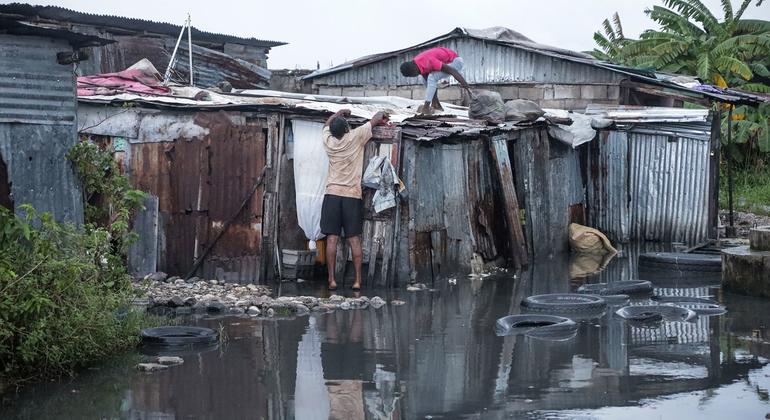Sure! Here’s the translation to American English:
—
Hurricane Melissa, the strongest recorded in 2025 and one of the three most intense in Cuba’s history, has left a devastating mark on the Caribbean. This weather phenomenon made landfall in Jamaica as a Category 5 hurricane on the night of October 28, before weakening to Category 3 and continuing its destructive path toward Cuba, Haiti, and the Dominican Republic. Torrential rains and winds exceeding 200 kilometers per hour have caused flooding and significant damage to infrastructure, as well as devastating losses in the agricultural sector.
From Havana, Francisco Pichón, UN resident coordinator in Cuba, reported that Melissa has particularly impacted the province of Santiago de Cuba, where the destruction of homes and flooding have been considerably severe. Pichón warns that the “needs far exceed the country’s response capacity,” emphasizing that the damage is exacerbated in regions already facing the consequences of Hurricane Óscar and two earthquakes that occurred the previous year. Moreover, the economic embargo and financial sanctions have severely complicated the procurement of necessary resources for humanitarian operations.
In Haiti, the situation has become even more critical following Melissa’s passage, with at least 24 deaths and infrastructure that is nearly completely devastated. Gregoir Goodstein, interim UN humanitarian coordinator in Haiti, indicated that the hurricane has unleashed intense rainfall, flash floods, and landslides. Thanks to preemptive funding, UN agencies managed to establish shelters and mobilize supplies before the hurricane’s arrival, which has partially mitigated the effects of the disaster.
The crisis extends beyond the borders of Haiti and Cuba. UNICEF estimates that over 700,000 children and adolescents across the region have been affected and urgently require food, safe drinking water, and access to health and education services. In response, UNICEF is deploying teams in the hardest-hit countries and has requested $46.5 million to assist 380,000 children and their families.
In Cuba, efforts are being implemented to protect food security and reduce agricultural losses, thanks to actions from the FAO funded by the Central Emergency Response Fund. UNICEF, for its part, is distributing hygiene kits and materials to ensure decent living conditions after the hurricane’s passage. In Jamaica, conditions are similarly critical, where assistance has reached over 284,000 affected children.
Haiti and the Dominican Republic are also facing parallel crises. In Haiti, over 1.4 million people are struggling with severe food insecurity, while in the Dominican Republic, the rains have impacted more than 60,000 people, and UNICEF is collaborating with the government to ensure health and nutrition services.
UN agencies have emphasized the need to act proactively in response to increasingly extreme weather events exacerbated by climate change. They urge international cooperation and unrestricted access to humanitarian funding as key aspects for the recovery of affected communities. As the total extent of the damages is assessed, the humanitarian impact of Melissa continues to be devastating and requires a comprehensive and coordinated response.
Referrer: MiMub in Spanish










